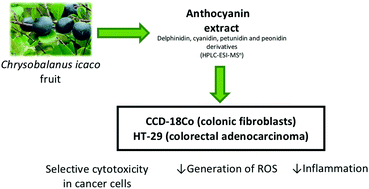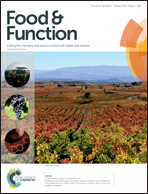Cocoplum (Chrysobalanus icaco L.) anthocyanins exert anti-inflammatory activity in human colon cancer and non-malignant colon cells†
Abstract
Cocoplum (Chrysobalanus icaco L.) (CP) is an anthocyanin-rich fruit found in tropical areas around the globe. CP polyphenols are associated with beneficial effects on health, including reduction of inflammation and oxidative stress. Due to its functional properties, the consumption of this fruit may be beneficial in the promotion of human health and reduce the risk for chronic diseases. The objective of this study was to assess the anti-inflammatory and anti-proliferative activities of anthocyanins extracted from CP (1.0 to 20.0 μg ml−1 gallic acid equivalents [GAE]) in CCD-18Co non-malignant colonic fibroblasts and HT-29 colorectal adenocarcinoma cells. Tumor necrosis factor alpha (TNF-α, 10 ng mL−1) was used to induce inflammation in CCD-18Co cells. CP anthocyanins were identified and quantified using HPLC-ESI-MSn. The chemical analysis of CP extract identified delphinidin, cyanidin, petunidin and peonidin derivatives as major components. Cell proliferation was suppressed in HT-29 cells at 10.0 and 20.0 μg ml−1 GAE and this was accompanied by increased intracellular ROS production as well as decreased TNF-α, IL-1β, IL-6, and NF-κB1 expressions at 20.0 μg ml−1 GAE. Within the same concentration range, there was no cytotoxic effect of CP anthocyanins in CCD-18Co cells and TNF-α-induced intracellular ROS-production was decreased by 17.3%. IL-1β, IL-6 and TNF-α protein expressions were also reduced in TNF-α-treated CCD-18Co cells by CP anthocyanins at 20.0 μg ml−1 GAE. These results suggest that cocoplum anthocyanins possess cancer-cytotoxic and anti-inflammatory activities in both inflamed colon and colon cancer cells.



 Please wait while we load your content...
Please wait while we load your content...